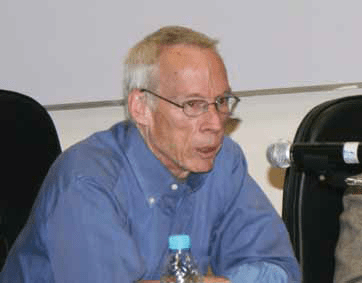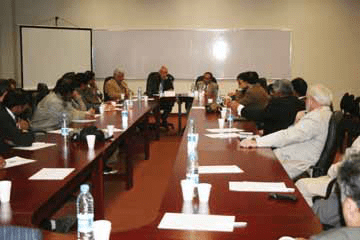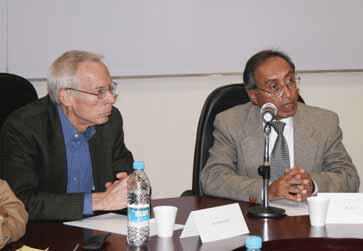
Mark Ward, Special Advisor on Development with the United Nations Assistance Mission in Afghanistan (UNAMA) delivered a talk on Afghanistan Policy: Challenges of Reconstruction and Development on the 21st of December 2009 at the Centre for Public Policy & Governance with Dr. Rasul Bukhsh Rais, Professor of Political Science, Lahore University of Management Sciences as the Discussant.
Mr. Mark Ward began his talk by stating that key decisions and changes have to be made by the donor and international community in helping Afghanistan as we move from the first to the second decade. He asked the audience to picture how it all began in 2002, when donors came to Kabul in record numbers after the Taliban were driven out. They flew in from capitals all over the world carrying big suitcases full of money, took their places around the table leaving two empty chairs for somebody from the government to walk in and say ‘this is what we want you to do’, ‘these are our priorities, this is what we want you to spend your money on’. But no one from the government showed up and as donors’ governments questioned them and pressurized them to do something, they had two choices: first, to wait for the Afghan government to show up, second, to get started without it.
The donors when they arrived in Bonn in 2002 had goodwill; they had guidance neither from the Afghan government nor from their own capitals. Furthermore, neither they nor their capitals were patient and thus their strategy was to start the programs and figure out things as they progressed. Enormous programs in terms of money involved, were started in 2002 with very little input from the Afghan Government. The same happened a couple of years later with Provincial Reconstruction Teams (PRTs), originally the forward operational bases around the country run by foreign militaries including the US, UK, Canada, Sweden, Germany, France and Italy (see Figure 1). Awash with money, they started “Quick Impact Projects” without talking to anyone and even if they did find someone, it was the local warlord.
As large amounts of money were spent around the country, the Afghan Government gradually wanted to take a hold of this donors and PRT juggernaut to follow the Government’s lead and spend money according to its priorities. But there were only a couple of ministers in 2004-2005 with enough confidence, experience and discipline, and were also loud enough to convince the donor community to support the Afghan plan. Thus successful national projects were started in three areas; basic education, public health access and rural development. Most of the other sectors remained in chaos as donors ran amuck following directions from their far off capitals, mostly implementing projects without understanding the Afghan reality or discussing with the Afghan government. With no one in charge and no donor coordination, there was duplication of effort in some areas while other areas were neglected leading to wastage of money. The UN Security Council acknowledged it and mandated UNAMA about a year and a half ago to help the government reign in donors and coordinate the development effort.
“…perverse incentives forced personnel to continue with quick impact projects rather than involving the Afghan government for slow or mediumimpact projects”
Ward was asked to lead this new team at UNAMA fifteen months ago. His initial thinking was that if he could help the government put good programs, ideas, initiatives and action-plans in front of the donors, surely they would fund them and the money would start to coalesce behind the government programs rather than behind multitudes o f donor programs. But he soon learnt that this was not enough as it was very hard to break bad habits. Although some very good ideas were put in front of the donors, still they would rather fund their own ideas than of the governments. Ward stated that UNAMA had made little bit of progress in the last fifteen months but had a long way to go. More importantly, he argued that Afghanistan was at the crossroads and the one thing that needed to be done differently was to start investing in the capacity of the government to design programs. This required spending money on building organizational capacity and institutionalizing the program design process, which was currently individual based and ad-hoc. But a bigger challenge was to convince the reluctant donors to fund Government plans when the Afghan Government was perceived to be corrupt, as donors thought that they could keep track of their hard-earned tax money only if they spent the money themselves. Ward argued that the biggest challenge in moving from US Government to the UN was that it was unable to influence anyone given UN’s lack of power and authority over donors and member countries. He stated that UNAMA was even having a hard time coordinating UN agencies in Afghanistan, as they also followed instructions from their own headquarters and behaved much like the donors. Thus UNAMA’s and Afghanistan’s challenge for the second decade of the new century was to lead these seven years in the making donor juggernaut into a new direction without the necessary authority over them.
“…donors ran amuck following directions from their far off capitals, mostly implementing projects without understanding the Afghan reality”
Ward argued that any serious effort to transition governance and development to the Afghans through the reduction of troop levels and international community could only work when the country could manage its own affairs. This practice of funding projects designed thousands of miles away and funding quick impact PRT projects was neither helpful for Afghans nor sustainable. He pleaded that it was time to start trusting the Afghan Government especially the ministries that had shown their capacity to handle money and design programs, and use small projects to build Afghan capacity rather than just talk about transition. Another aspect that hindered transition to Afghans was the incentive structure of the PRTs. As world capitals wanted to see their men and women in uniform doing good things, short six months tenures required personnel to execute small projects, concluding with a ribbon cutting picture for promotion. Thus even if these personnel understood that their building of schools, clinics, roads and wells in the presence of Afghan Government was actually doing harm rather than good, perverse incentives forced them to continue with quick impact projects rather than involving the Afghan government for slow or medium-impact projects.

In conclusion, Ward stated that UNAMA’s message at the next international conference on Afghanistan was clear that if the international community was serious about transition then it was time for the Afghans to get into the driver seat and for the donors to start following, putting their money in government projects and telling PRTs to quit doing what the Afghans could do.
Commenting on Mark Ward’s talk, Dr. Rasool Bux Rais elaborated that reconstruction of state, society, economy, infrastructure and institutions in Afghanistan was linked to political reconstruction, regional diplomacy and security inside and around Afghanistan. Afghanistan was a unique case as the country had gone through three cycles of conflict over the past thirty years, and one casualty of the war had been the Afghan State. The loss of the State had been great as modernization of society, development and improvement of the human conditions was just not possible without some State capacity. It was this absence of the State, an institutional rather than an individual absence that was the key point of Ward’s talk. Although an authority structure was sanctioned at the Bonn conference and later at the 2002 elections, the institutional capacity still needed to be built to guide, to give ideas or to follow good ideas of the international community. Government did not mean picking up a team under Mr. Karzai. It meant institutions, security and democracy using the entire infrastructure of the State.
Rais’ own assessment was that the international community had lost too much time and wasted too much energy and resources to be at the crossroad of the Afghan project. He argued that even if Afghanistan continued to fail because of various problems highlighted by Ward, there was still no alternative as no one would like to leave this project unfinished. It was both strategic, moral as well as the collective responsibility of nations that Afghanistan succeeded, as the alternative would be a strategic disorder in the region with the impact of violent transnational movements far beyond it.
The presentations were followed by a vibrant question and answer session. Answering a question if most of the money donated by foreign governments went back to their home nations through consultants and procurement?, Ward accepted the argument that donors’ importing of everything from outside was wasteful, stating that about 60% of the donated money did stay at home rather than becoming a part of the Afghan economy but it was changing for the better. The Afghan government did take a stand when the civilian surge was announced at the Hague Conference. It initiated a Local Procurement Campaign arguing that while it needed advisors to improve government’s capacity, advisors who didn’t speak the language, couldn’t stay long in Afghanistan, and required extensive security costs could not be effective. Recognizing that not a lot had been achieved in the last seven years, donors accepted the plan but years of bad habits would take a while to go away. He argued that although capacity of the Afghan private sector had grown over the years, it was still a challenge to get donor funded PRTs to hire Afghan firms and NGOs.
“…reconstruction of state, society, economy, infrastructure and institutions in Afghanistan was linked to political reconstruction, regional diplomacy and security inside and around Afghanistan.”
In answering a question challenging the capacity of Afghan Government outside Kabul and the involvement of Afghan Diaspora in the reconstruction effort, Ward gave the example of District Governors in Afghanistan who got paid $60/month with a monthly operating budget of $15/ month while stating that in such situation, the warlords with more power and resources could not be constrained. Thus capacity building was a definite need and was aggressively projected by UNAMA, but it was still a hard sell among donors who wanted working accounting and monitoring systems before providing any money, and immediate results for their domestic constituency. But this did not mean that the Afghan Government had no capacity as the Ministers of Finance, Agriculture, Health, Education, Commerce and Rural Development (Ward had not interacted with the Government’s security team) had solid teams and understood the challenges that confronted them. Still they needed help in interacting with donors. Some members of the cabinet were from the Diaspora, which had come back to Afghanistan from different parts of the world. But unfortunately even the Diaspora who w ere contributing to the reconstruction effort was at times mistrusted by general Afghans.
With regards to a question challenging democratic and representative credentials of the Afghan Government, perceived occupation of Afghanistan and the possibility of sustaining an insurgency without majority support, Ward did not defend the popularity or representativeness of the Afghan Government while stating that the elections were certified by the International Election Commission. Still he took exception to the popular support for the Taliban stating that in the opinion polls conducted every year, there was still a very negative reaction to the Taliban. Taliban support was very small and limited to the communities they controlled. Discussing occupation, he stated that domestic constituencies in all Western countries including America wanted to bring their troops home rather than seeing their young fight, die and at times commit crimes and thus these countries did not see themselves as occupiers. This was also the reason why Obama had given an 18 month timeline to draw down troops.
“…if the international community was serious about transition then it was time for the Afghans to get into the driver seat”
Rais instead took a broader view arguing that Afghanistan was a product of strategic understanding between the British and the Russians, a state on the frontiers of all neighboring states and the only state in the world where majority ethnic groups lived across the border. Afghanistan thus needed to strictly define its boundaries and act as a neutral state as its internal stability depended on it. He suggested two pre-requisites for peace in Afghanistan. First, peace beyond boundaries as cross border involvement from and in Afghanistan was likely because of the intrigue and strategic concerns of Afghan neighbors including Russia, India, Iran and Pakistan which could again plunge it into a civil war. Second, peace among the ethnic groups. Rais argued that the 1990s Civil War was an outcome of the Taliban’s (who were mainly considered part of Pashtuns) lack of accommodation of minority ethnic ethnic groups’ national aspirations, which further extended to a confrontation with Iran (& other neighboring states). Further exploring the ethnic dimension, he argued that though Taliban were not the enemies of America and had no role in 9/11, they were now part of the Pashtun ethnic group fighting the American and international forces. Rais thus argued that both intra-afghan ethnic composition and the regional dimension needed to be kept in mind before lasting peace could be achieved in Afghanistan. He contended that voices arguing for international forces to go home tomorrow based on public opinion and moral ground needed to answer two important questions. One, what kind of a signal would a triumphant Taliban and religious militancy in Afghanistan give to Tehrik-e-Taliban Pakistan? Two, would it lead to another mini Great Game played by regional actors as throughout the 1990s? Instead, Rais argued that the need was to put Afghanistan back on track.

Answering a question if donor funds were being funneled into militant hands and if poppy cultivation was an issue in terms of reconstruction and the Taliban insurgency, Ward accepted that the odds for employing bad guys to provide security for infrastructure projects were pretty good though it was not intentional. He added that a new system to register security firms was being introduced to close such loopholes. There was also good news on the poppy front with the exact status available at the United Nations Office for Drugs and Crime (UNODC) website. Production and cultivation were down and 22 provinces were poppy free. Cultivation was even down in Helmend by about 20% this year owing to a number of factors including high wheat price. But it was not straight forward as Nangahar province which went poppy free four years ago again saw poppy cultivation two years back .
Answering a question in reference to imposing a Western style system on the Afghans and expecting that democracy would pay dividends, Rais suggested to the audience to perceive Afghanistan the way international community found it in 2002 in statelessness. He challenged the audience to imagine what statelessness meant? He suggested bringing the events of 1947 to mind when an imperial state collapsed at the time of partition giving rise to a Hobbesian man. Having no capacity didn’t mean that there was some inherent weakness in the Afghans. It meant a lack of institutional capacity due to decades of war. But the Afghan State was evolving, developing and one had to accept that infrastructure and institutions are built over time. A legitimate government required a democratic order though its quality would be conditioned by the socio-cultural circumstances of the locale. Finally, in answering a question regarding the importance of local involvement in development specifically of the Pashtuns in Afghanistan and how could the juggernaut courtesy of Kerry Lugar Bill (KLB) would be handled intelligently in Pakistan? Ward argued that the major developmental successes in Afghanistan since 2002 had been of the Afghan ideas. The seven million Afghan kids in school and 65% people with access to basic public health was mostly because of a couple of strong ministers. The National Solidarity Program was also a popular project as it involved the community through Community Development Councils whereby community’s ideas were funded given the community bore at least 10% of the costs. Ward argued that it was important to institutionalize these programs and make similar progress in other areas. Regarding development in Pashtun areas, he stated exactly the opposite arguing that UNAMA had actually criticized the international community for spending funds in areas where their young men and women were fighting while ignoring important parts of the country. He argued that United States was spending almost 80% of its foreign aid in Afghanistan in the South and East. On KLB his departing advice was: “Please learn to say no to the donors. They’re not going to take their money and go somewhere else, at least not right now.”
Citations

